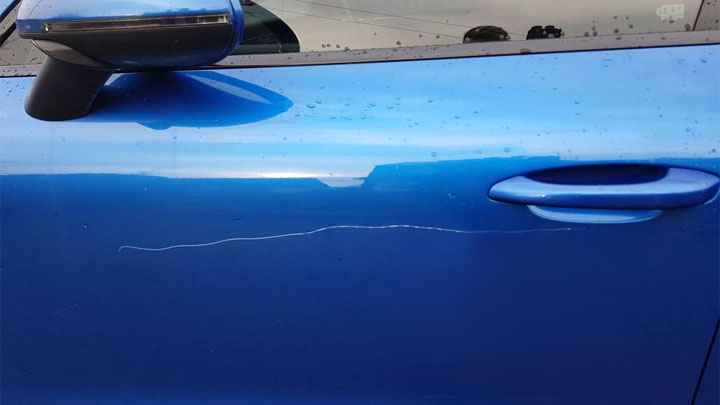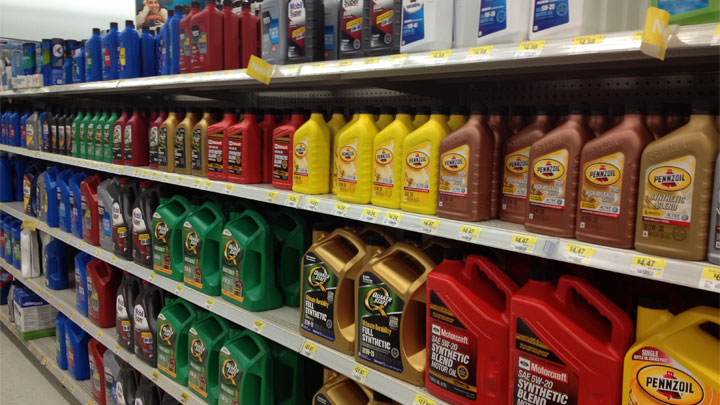Last Updated on June 16, 2022
The last thing you want to see when you look at your car, but no matter what you do, it’s only a matter of time until they start to appear. But there are far more than just one type of scratch, which makes a big difference in how easy they are to repair.
That’s why we came up with this guide to walk you through everything you need to know about different automotive scratches, including how you can identify different types and repair them yourself!
Types of Scratches on Cars
There are many different kinds of scratches possible on cars, and if you’re looking to get your vehicle back in order, it’s essential that you identify which type of scratch your vehicle has and then address the repair appropriately.
That’s why we highlighted six different types of vehicle scratches you might find on your vehicle for you here.
#1 – Clear Coat Scratch
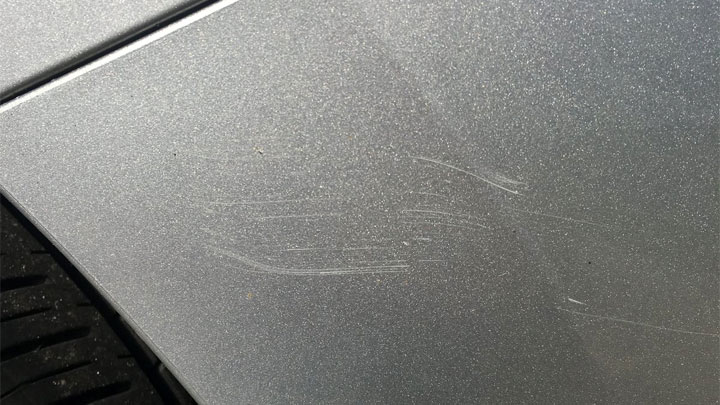
Clear coat scratches are the most common type of car scratch, and luckily, they’re the easiest to address and fix. Clear coat scratches only affect the outermost surface of your car, they don’t actually scratch paint, just the outer protective layer.
How to Identify
While there are a lot of different techniques out there to help you identify a clear coat scratch, the easiest way to check is to see if you can feel it with your fingernail.
If you can see the scratch but your fingernail doesn’t catch the scratch when you gently run it over the area, it’s a clear coat scratch.
Causes
There are a lot of potential causes of a clear coat scratch, but one of the most common causes is debris from the road. As you drive down the road rocks and other debris kick up, and if they hit or graze off your car they can scratch the clear coat.
Another potential cause of a clear coat scratch is sleet, hail, and just about anything else that bumps into your car. Shopping carts are a common culprit, as are kids!
Even bird poop will scratch up your paint if left on too long or improperly removed.
Repair Process
If all you have is a clear coat scratch on your vehicle, the repair process is pretty simple. You simply need to reapply another layer of clear coat on the area to fix the problem. These are what most scratch repair kits (like Meguiar’s) actually fix.
They don’t match paint colors or anything else, but they fix clear coat scratches and get that protective layer back on your vehicle!
Repair Cost
If you’re completing the repairs yourself, you can expect to spend anywhere from $15 to $30 to get everything you need to repair the clear coat scratch.
However, if you take your vehicle to an automotive repair shop, you can expect them to charge you anywhere from $100 to $300 to fix the clear coat depending on the size and shop you take it to.
See Also: How Long Does Clear Coat Take to Dry?
#2 – Base Coat (Paint) Scratch
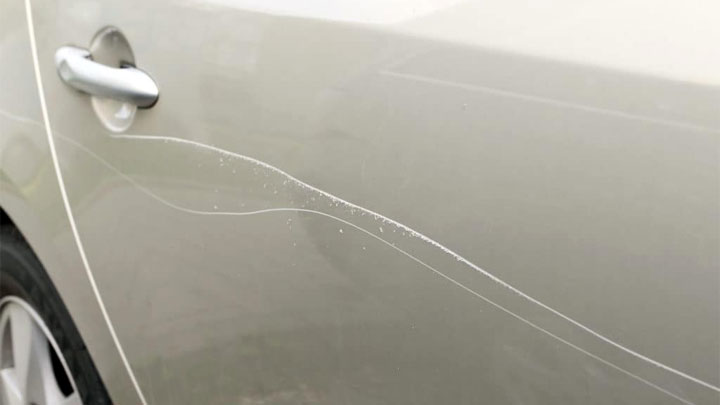
The next level of scratch is a base coat, also known as a paint, scratch. These scratches start to peel away at the paint, but they haven’t completely gone through the paint yet. They’re still fairly easy to fix with the right kit, but not every kit will get the job done.
How to Identify
It’s pretty much the same process you test for a clear coat scratch, but with the opposite result. If you do feel something when you run your fingernail over the scratch, you have a base coat scratch. However, you’ll still see the paint color with this type of scratch, not metal.
Causes
Pretty much everything that can cause a clear coat scratch can cause a base coat scratch, it just hits your vehicle with a little more force and takes a little more off. Another cause is that you don’t fix the protective clear coat when it has a scratch, then something else hits the same area.
Repeated impacts to the same area can elevate a clear coat scratch to a base coat scratch.
Repair Process
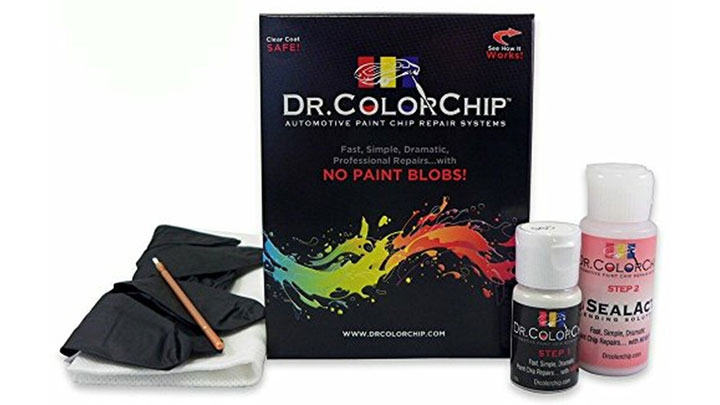
Most, but not all, products that repair a clear coat scratch (we like this Chemical Guys product) will help hide a base coat scratch too. It might take a few more applications to get a smooth surface though. Take your time and only use high-quality products when repairing a base coat scratch.
But with most base coat scratches, a polishing product can only do so much. For better results, you’ll want to use some touch-up paint.
The easiest way to do so is with a product like Dr. Color Chip. With some patience, it’s completely possible to complete the repairs yourself. It works because they match your vehicle year, make, and model, or use the factory paint color to get you the EXACT paint for your vehicle.
It may not be a perfect color match because of aging from UV rays, and for deep scratches, it may not look flawless up close. But it’s as close as you’re going to get without repainting the entire affected panel and blending around.
Repair Cost
If you’re looking to complete the repairs yourself, you can expect to spend anywhere from $20 to $70 to get everything you need to repair the scratch. However, if you take it to a repair shop, expect to spend anywhere from $200 to $500 for them to fix it for you.
#3 – Primer Scratch
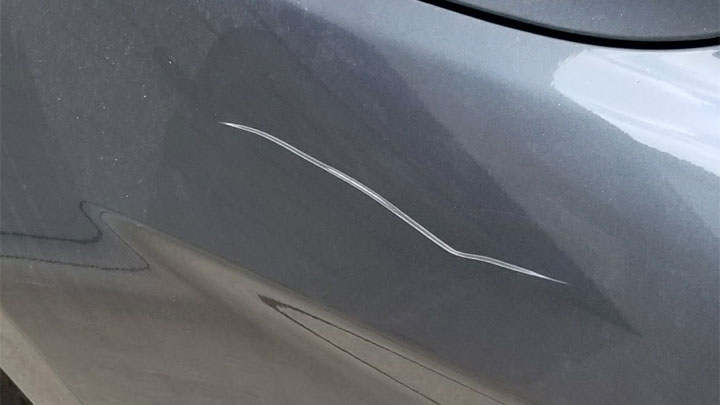
If your vehicle has deep scratches that expose the metal of your vehicle, you have a primer scratch. Primer scratches are the deepest types of scratches your vehicle can have, and they’re also the most serious if you don’t repair them.
Primer scratches will lead to rust and all sorts of other problems if you don’t address them quickly. While it can be a bit more expensive to have a repair shop fix them, luckily we’ll highlight another option for you here.
How to Identify
If you have a primer scratch, they’re usually pretty easy to identify. What you’re looking for is bare metal. If you see any metal on your vehicle, you have a primer scratch.
Causes
Luckily for everyone, primer scratches don’t have a ton of causes. The first possible cause is an older vehicle that you never took care of the paint. Smaller scratches add up, and if you don’t take the time to restore the clear coat eventually those smaller scratches will work their way through the paint and to the primer.
Another potential cause is an accident of some sort. Accidents do a lot of damage, and it’s not uncommon for them to take a good chunk of paint off and create some primer scratches.
Repair Process
While repairing primer scratches is definitely more in-depth, with a product like Dr. Color Chip it’s possible to repair some deeper scratches yourself. With a DEEP scratch, having an auto body shop do the repairs is often the only real option to get your car back to pre-scratch condition.
But if professional repainting isn’t in the budget, it’s often worth it to give Dr. Color Chip a shot as long as you have realistic expectations. It can hide a deep scratch pretty well but it can’t work miracles.
Repair Cost
If you use Dr. Color Chip it’ll cost you anywhere from $40 to $70 to fix the scratch. While this might seem a little more expensive, when you compare it to the repair shop that will charge you anywhere from $500 to $1,500 to repair your vehicle, you’re getting a steal and saving a ton of money.
#4 – Wheel Scratch (Curb Rash)
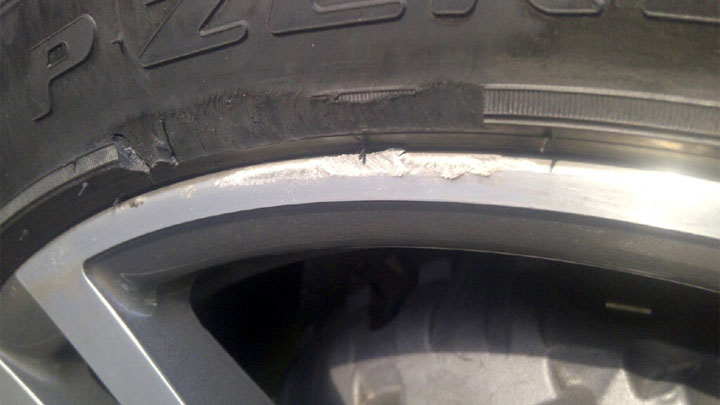
Not every scratch on your vehicle shows up on the paint! Another very common type of scratch appears on your wheels, and it’s commonly referred to as a curb rash. We’ll highlight how those scratches occur and what you can do to fix them here.
Causes
By far the most common cause of a wheel scratch is that you pull too close to a curb and it rubs. When this happens, it can either scratch or scuff the wheel. Rocks and other road debris can lead to wheel scratches, but typically it’s chipped, and even these are relatively rare.
Repair Process
To repair a wheel scratch correctly, you really need to sand and repaint it or powder coat them. This is a labor-intensive process, but it’s how you get the best results. They do have some easy-to-use products (example), but you’re really covering up the scratch, not fixing it.
Repair Cost
While it can be a little more labor-intensive for you to repair your own wheel scratch, the good news is that most automotive repair shops will do it for a reasonable cost.
For smaller wheel scratches they can complete the repairs for about $50, but for larger issues, it can go up to $400. Keep in mind that this is the price per wheel.
#5 – Glass Scratch
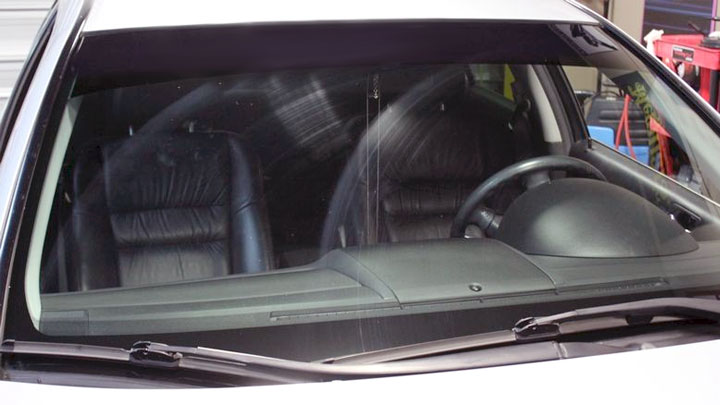
If you’re dealing with a scratched windshield or another scratched glass surface on your vehicle, then you have a glass scratch. But what can you do about a glass scratch, and what causes them in the first place? We’ll address both issues here.
Causes
Glass scratches, especially on the windshield, are a fairly common occurrence. They often occur when a piece of road debris glances off the glass, but it doesn’t hit it hard enough to crack anything.
Scratches can also occur in dusty or sandy environments, especially when something kicks the sand up. However, the most common cause of glass scratches on your windshield is old windshield wipers. The longer you use the faulty wipers, the deeper the scratch will get.
Repair Process
If the glass only has smaller scratches, you might be able to buff them out with a polishing compound. A product like Griot’s Garage Fine Glass Polish works great, but you can also use non-gel toothpaste for minor scratches.
See Also: How to Remove Window Tint Without Scratching Your Glass
Repair Cost
If you’re completing the repairs yourself, you can expect to spend anywhere from $10 to $20 to get everything you need. Some repair shops will repair the scratches for you for around $50, but not every repair shop even offers glass scratch repair services.
Instead, they try to push you into replacing the glass. For a windshield that can range between $200 and $500.
#6 – Plastic Trim Scratch
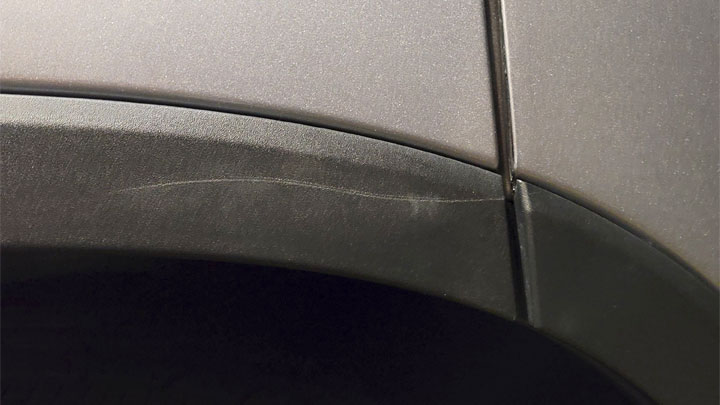
If you have a scratch on a plastic trim panel, it’s not quite the same as a scratch on your vehicle. Sometimes these scratches can be easier to repair, and sometimes you need to replace the component.
Causes
Anything that can cause a clear coat scratch can scratch the plastic trim piece too – it’s all about where the impact occurs. Road debris is a common cause of these scratches, but just about anything that hits the trim piece can scratch them.
Repair Process
Repairing a plastic trim piece is much like repairing a glass scratch. Get a polishing compound and apply it to the affected area to see if you can’t remove any swirl marks or scratches that are there. Once again, you can also use non-gel toothpaste for smaller scratches.
But keep in mind that both options will only help with smaller scratches. If it’s a deeper scratch, there’s only so much buffing you can do to fix it.
Repair Cost
If you’re repairing it yourself you can expect to spend anywhere between $5 and $20 to get the various compounds and materials you need. However, most repair shops will not complete these repairs for you. They’ll want to replace the piece, and that cost can vary quite a bit depending on the exact component.
Scuff vs Scratch (What’s the Difference?)
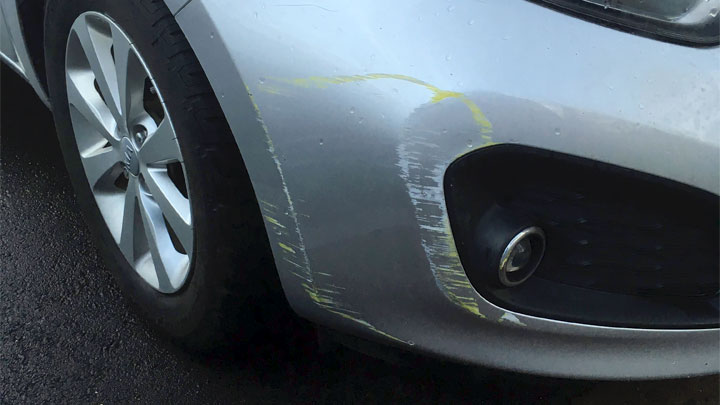
When you’re looking at damages to your vehicle’s paint, the first thing you need to figure out is whether or not the damage is a scuff or a scratch. The two things are not the same, but they also happen at the same time.
Scuffs are surface damage, often residual paint left behind from whatever hit the car. If it’s just a scuff you can buff it out. You won’t need any compounds or anything else to fix your vehicle.
A scratch occurs when something actually breaks through the clear coat or further. In accidents you’ll often have a scratch at the deepest point of impact, and scuffs can occur around the edges.
Read Also: Average Cost to Repaint a Bumper
Does Car Insurance Cover Scratches?
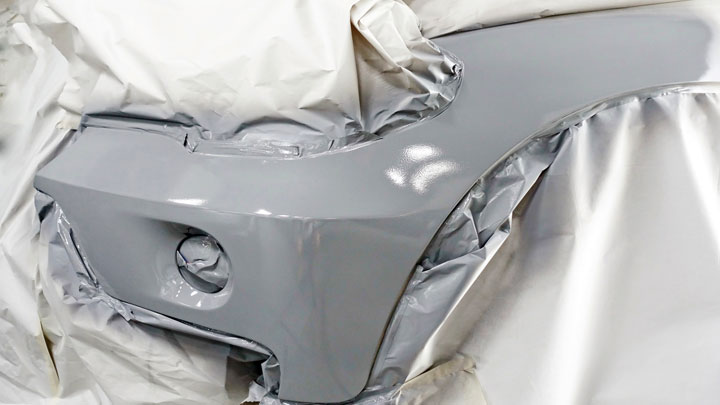
It really depends on how the scratches appeared on your car. If they occurred from debris while driving down the road, car insurance probably won’t cover them. However, if the scratches came from an accident, then insurance should cover them, as long as you have comprehensive insurance.
Also, it’s worth keeping in mind that for most scratches it might not be worth filing a claim because you’ll still have to pay your deductible. Not only that, but many insurance companies choose to up your rates after you use them.
That means you might end up paying even more to get your insurance to cover your scratches even if they will cover them.

